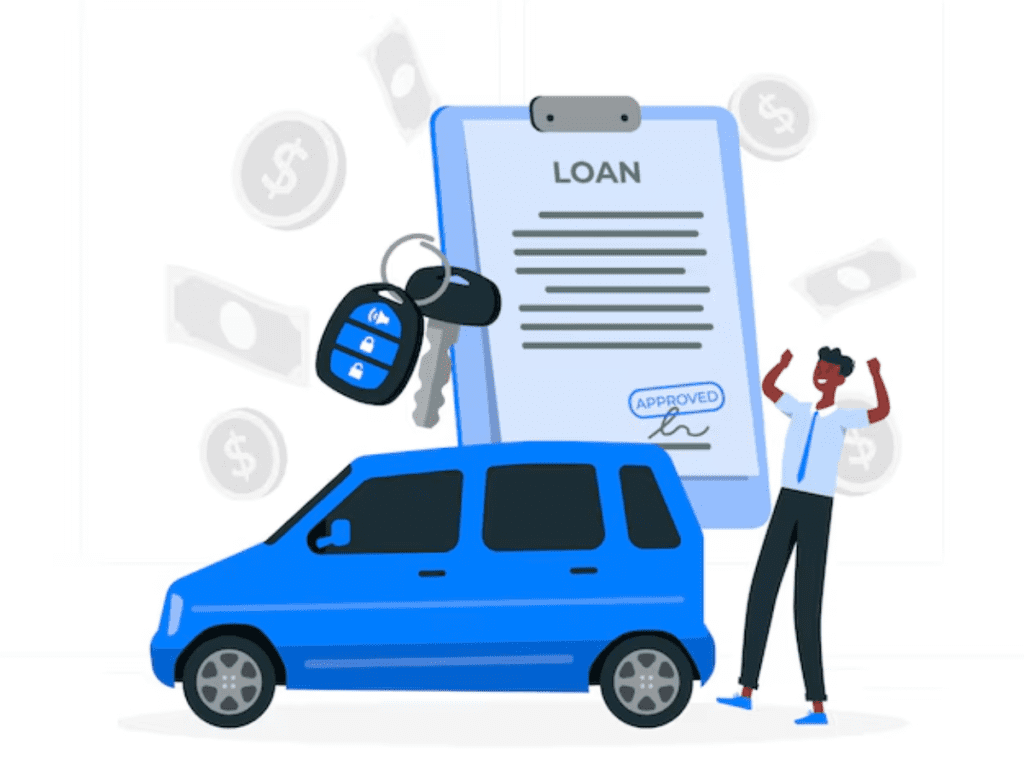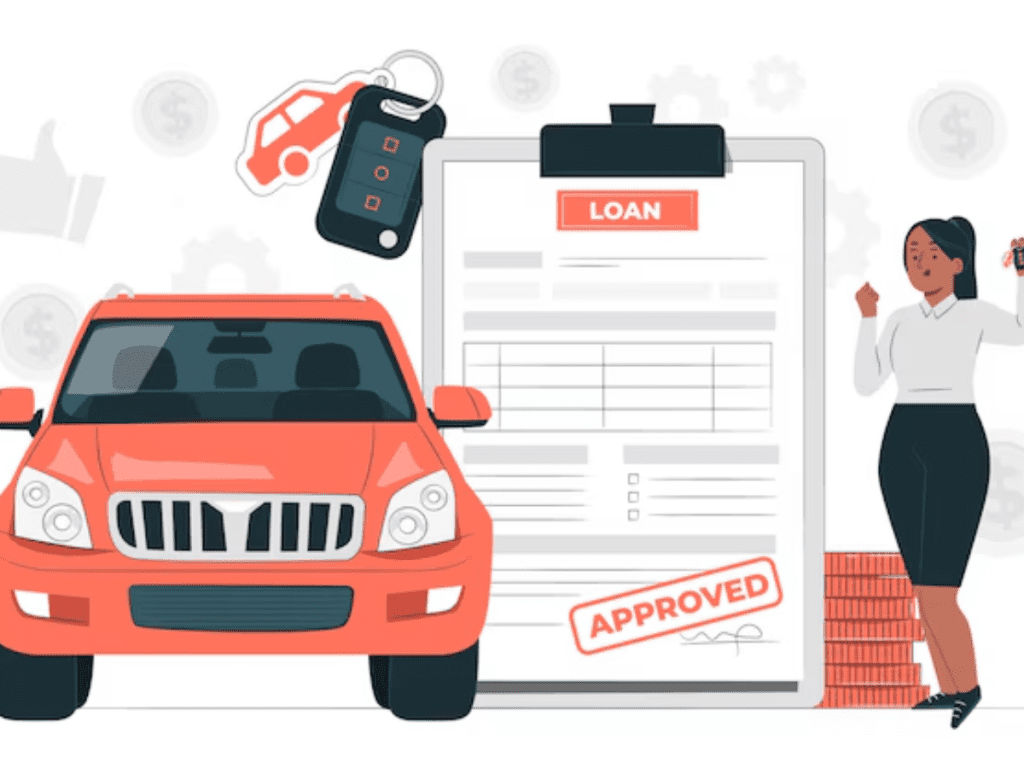Introduction
Purchasing a vehicle is a thrilling but sometimes costly choice. For most, paying through a car loan is the only realistic means of financing a new car. While traditional car loans necessitate a down payment to achieve improved terms, zero-down auto loans provide a comparable option, enabling purchasers to leave the dealership without an initial payment.
On the surface, a zero-down loan sounds like a good thing—after all, you don’t have to pay any money out of pocket. But before you take out this type of loan, you should know how these loans are structured, their pros and cons, and whether or not they are suitable for your financial condition.
What Is a Zero-Down Auto Loan?
A zero-down auto loan is a car financing option in which the buyer is not required to make a down payment when buying a car. The full price of the vehicle is instead financed in the loan, so the buyer will begin making payments right away.
By comparison, conventional auto loans usually have a down payment of 10% to 20% of the car’s purchase price. The down payment serves to reduce the loan amount, which in turn decreases interest payments and monthly installments. But with a zero-down loan, you finance the entire cost of the vehicle, which can translate to more interest paid over the long term.
Zero-down auto loans are available through banks, credit unions, and dealerships but tend to have tighter qualifications, as lenders view them as a riskier type of financing.
How Zero-Down Auto Loans Work
When you take out a zero-down car loan, the lender assesses your credit score, income, employment history, and debt-to-income ratio to see if you qualify. Since these loans have no down payment, lenders might charge higher interest rates or demand better financial credentials to reduce their risk.
After being approved, the lender pays 100% of the vehicle’s purchase price, and you commit to paying back the loan in the form of monthly payments over a predetermined period (typically 36 to 72 months). The cost of the loan will vary according to the interest rate, term of the loan, and any other fees that may be incurred with the financing.
Essential Elements That Influence Zero-Down Auto Loans
- Credit Score Requirements
- Lenders typically demand an excellent to good credit score (usually 650 or better) to sanction a zero-down car loan. Borrowers with poor credit scores can still qualify but will probably have to pay higher interest rates or more stringent loan terms.
2. Interest Rates
- Since the entire price is financed by the lender, zero-down loans also usually involve more money for the loan in total, higher interest rates, compared to a normal loan. A few additional tenths on an annual basis will run thousands more out during the time a vehicle is owned.
3. Loan Term
- Some borrowers take out longer terms of the loan (e.g., 60 or 72 months) so they can keep their monthly payments lower. Longer loan terms, though, require paying more interest and increase the total cost.
4. Vehicle Depreciation
- Vehicles lose their value fast, with 20-30% of the value gone just in the first year. Because a zero-down loan pays for the full purchase price, there is more chance of negative equity, where you owe more on the loan than the vehicle is worth.
Advantages of Zero-Down Auto Loans
Zero-down car loans may prove to be advantageous in certain scenarios, particularly when you require the car urgently and do not possess funds for the down payment. The following are some of the benefits:
1. Immediate Vehicle Ownership
- You may get a car without saving for a down payment when you use a zero-down auto loan. This might be convenient if you are in immediate need of a car for employment, family, or other needs.
2. No Huge Upfront Expenses
- Because you don’t have to pay an initial down payment, you can retain your savings for other purposes such as rent, emergencies, or investments.
3. Special Promotions and Dealer Incentives
- Some dealerships have zero-down financing promotions with reduced interest rates included. These are tempting if you’re eligible for special financing conditions.
4. More Buying Power
- Without the financial weight of a down payment, you might be able to buy a nicer or newer vehicle than you could otherwise with a regular loan.
Disadvantages of Zero-Down Auto Loans
While there are advantages, zero-down auto loans have some huge disadvantages that make them costlier and more risky financially.
1. Increased Monthly Payments
- Because you are paying 100% of the cost of the car, your monthly payments will be much higher than if you had paid a down payment.
2. Higher Interest Charges
- With a greater loan value, the amount of interest paid during the entire course of the loan is higher, which costs more in the long term to own the car.
3. Danger of Negative Equity (Owing More Than the Value of the Car)
- Since new vehicles depreciate rapidly, you could end up owing more than the worth of the car (referred to as negative equity). If you must sell or trade in the vehicle before the loan is satisfied, you might be required to pay the difference out of pocket.
4. Stricter Loan Approval Criteria
- Zero-down loans are riskier for lenders, and therefore usually demand better credit scores and evidence of steady income. Borrowers with poor credit will find it hard to qualify.
5. Extra Charges and Loan Conditions
- Certain zero-down loans have hidden charges, longer loan periods, or prepayment penalties, which add up to the final cost of the vehicle.
Is a Zero-Down Auto Loan the Best Option for You?
Before you opt for a zero-down auto loan, take the following into consideration:
When It Could Be a Good Idea:
You possess a good credit score and can get a low-interest rate.
You require a car urgently and do not have time to save for a down payment.
You are eligible for favorable promotions that have favorable terms.
You possess a stable income and job to service increased monthly payments.
When It May Not Be a Good Idea:
You possess a poor credit score and would be offered high interest rates.
You are concerned about equity loss and depreciation.
You have other financial commitments that make monthly payments too hard.
You are willing to wait and save for a down payment in order to qualify for better loan terms.
Ways to Save Money on a Zero-Down Auto Loan
If you choose to have a zero-down auto loan, these are some ways to make it more cost-effective:
Boost Your Credit Score – A high score can make you eligible for lower interest rates.
Shop Around with Multiple Lenders – Shopping around can assist you in securing better loan terms.
Take a Shorter Loan – A shorter loan may result in higher monthly payments but less interest paid over the long term.
Avoid Unnecessary Add-Ons – Extended warranties and other dealer add-ons can increase your loan amount.
Make Extra Payments – If possible, making extra payments can reduce the principal faster and lower interest costs.
Exploring Alternatives to Zero-Down Auto Loans
If a zero-down auto loan seems too risky or expensive, there are alternative financing options that might be a better fit for your financial situation. Here are some strategies to consider before committing to a zero-down loan:
1. Saving for a Down Payment
The solution to the evils of zero-down auto loans is to save for a down payment when buying a car. Even making a small down payment of 5% to 10% will considerably lower the amount of the loan, decrease the monthly payments, and save interest.
How to Save for a Down Payment:
Establish a Monthly Savings Target – Figure out how much you must save for a down payment and establish a workable savings strategy.
Trim Discretionary Expenses – Slash spending on non-essential items, like eating out or subscription boxes, to leave more money available.
Have a Dedicated Savings Account – Separating your car savings will make it harder for you to use the money on something else.
Ponder a Side Gig – Working part-time or freelancing can assist with quicker savings.
Saving time to make a down payment could take a long while, yet it can produce improved loan terms, reduced interest payments, and lower total cost of ownership.
2. Pondering Lease Options
If you don’t have your heart on purchasing a car, leasing could be a cheaper option. Leasing tends to have a lower down payment and leads to lower monthly payments than taking out a loan.
Advantages of Leasing a Car Over Purchasing:
Lower monthly payments than financing a new vehicle.
You drive a newer car with the most up-to-date technology.
Less risk of negative equity, as you’re not responsible for depreciation.
Lease agreements often include maintenance and repair coverage.
Cons of Leasing a Car:
You don’t own the car at the end of the lease term.
Leases come with mileage restrictions, and exceeding them can result in extra charges.
There can be no modifications or personalizations made to the vehicle.
Leasing would work out fine if you like having a newer model at reduced monthly prices but are willing to accept you’ll never really have an ownership title for the car.
3. Getting a Certified Pre-Owned (CPO) Car
A new car isn’t always the only option—purchasing a certified pre-owned (CPO) vehicle is a savvy financial decision. CPO vehicles are checked, rebuilt, and guaranteed, providing a compromise between a new and a used car.
Advantages of Having a CPO Car:
Less Expensive – You can acquire a good-quality car for less money than a new car.
Slower Depreciation – CPO vehicles have already experienced the greatest depreciation period.
Warranty Protection – Most CPO vehicles have extended manufacturer warranties.
Lower Insurance Premiums – Used vehicles typically are less expensive to insure.
By purchasing a CPO vehicle, you can possibly escape taking out a zero-down loan and still acquire a solid, high-quality vehicle.
4. Getting a Co-Signer for Favorable Loan Terms
If your credit report is not good enough to secure a low-interest loan, then having a co-signer is the way out. A co-signer is a person with good credit who can promise to pay if you do not pay back the loan.
Benefits of Having a Co-Signer:
Can assist you in getting a lower interest rate.
Boosts your odds of approval for a longer loan term.
Allows you to build credit history in case of regular payments.
Consequences for the Co-Signer:
If payments are missed, the co-signer’s credit will be hurt.
The co-signer will become liable for the debt if you default on the loan.
If you go with this alternative, ensure that you are able to afford the loan payments comfortably so that your co-signer’s credit is not at risk.
5. Negotiating Loan Terms with Lenders
If you need to get a zero-down auto loan, bargaining for improved loan terms from lenders can cost you less. Most people just take the first loan quote that is offered to them, but shopping around and negotiating can get you lower interest rates and improved repayment terms.

